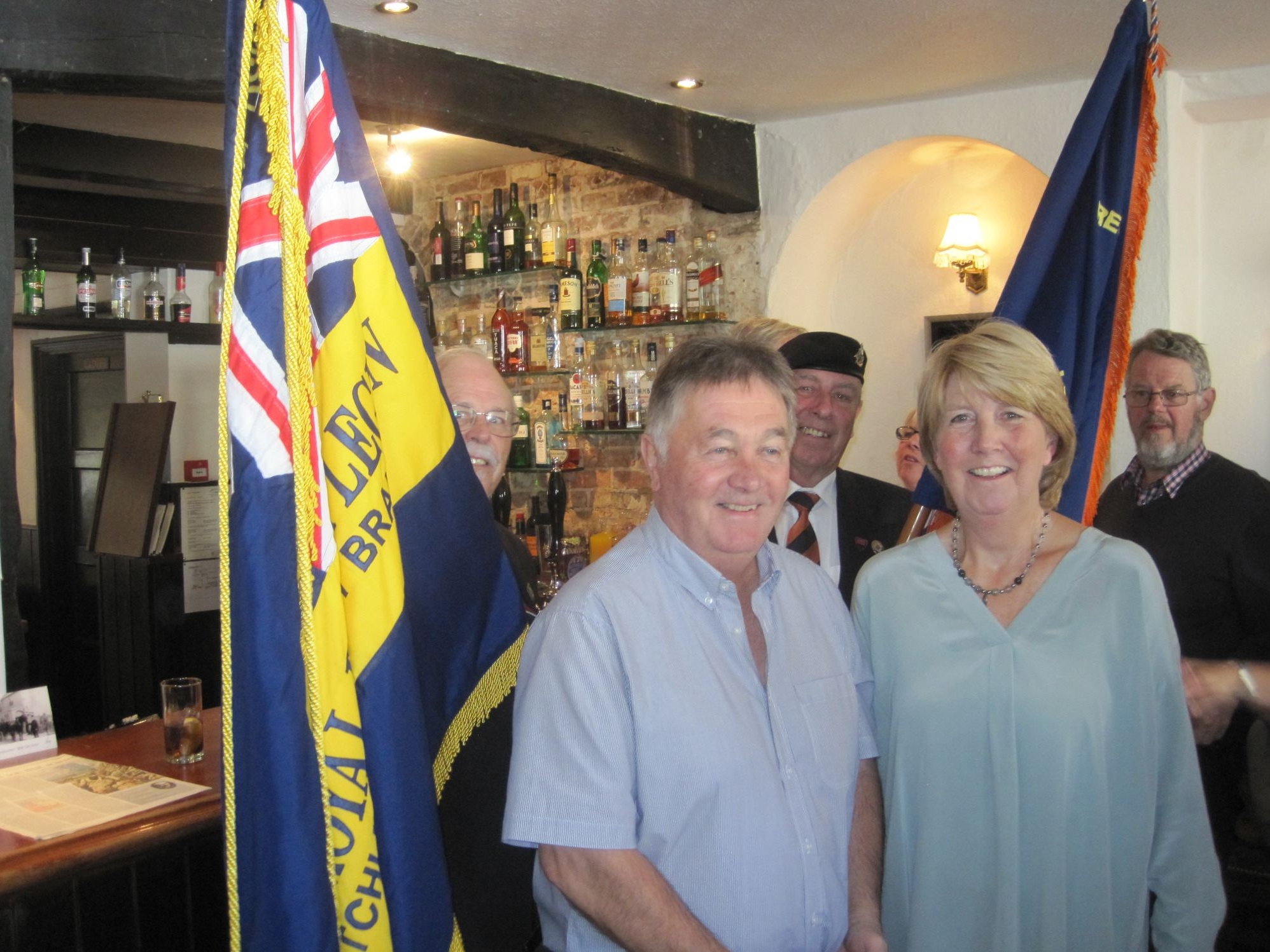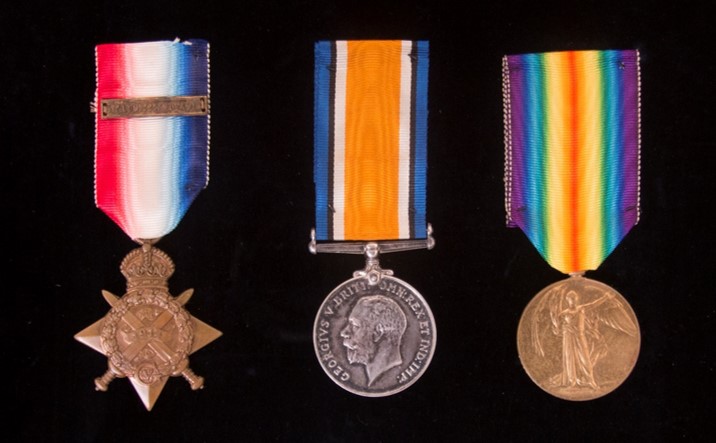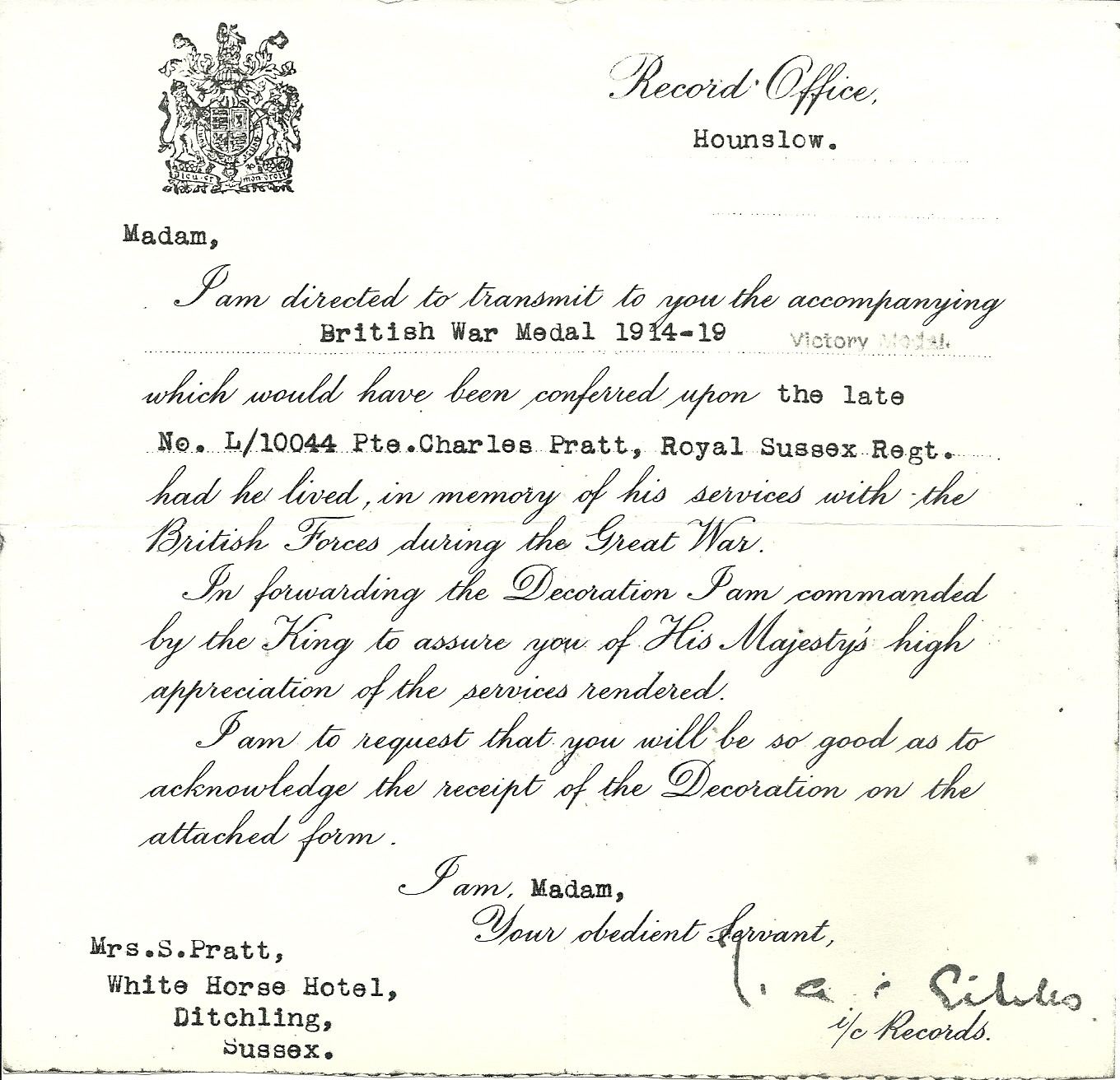World War II Medals Return to Ditchling
In mid 2015, Private Charles Pratt’s First World War medals were put up for auction. As Charles was the son of the landlord of the White Horse, we were keen to see the medals return to Ditchling and the White Horse. On 25 September 2015, 100 years after Charles’ death at the Battle of Loos, the medals were put on display in the pub where Charles grew up.
We would like to thank John Davies, the current landlord, for his continued support for the work of DHP and for generously allowing us to hold our drop in sessions at the pub. Do find time to come and see the medals - members of the History Project will be present every second Wednesday afternoon of the month at the regular drop-in sessions. Read on to learn more about Charles Pratt ...

The Medal Presentation, 25th September 2015: John Davies (left), Landlord of the White Horse and Carole Bolton, DHP (right)

Charles Pratt's War Medals: the 1914 Star, the British War Medal 1914 - 15 and the Allied Victory Medal. Collectively, these medals are often referred to as 'Pip, Squeak and Wilfred'

Letter accompanying Charles Pratt's British War Medal
PRIVATE CHARLES PRATT L/10044 2nd Battalion Royal Sussex Regiment Killed in action 25th September 1915
The Battle of Loos began on September 25th 1915 and the casualty list in The Times the following morning ran to four columns. Charles Pratt, who was just 20 years of age and had already been wounded twice, was killed that day and is listed with 20,000 others on the Loos memorial to the missing at Loos-en-Gohelle, a mining village 5 kilometres north of Lens.
Charles was the son of George Pratt and his first wife, Mary. George was born in Fishergate and joined the Royal Sussex Regiment as a young man serving in India where he was stationed at the entrance to the Kyber Pass. When he left the army he went to live in Southwick before taking over as landlord of the Bat and Ball at Chiddingly; from there he moved to Ditchling in 1908 to become landlord of the White Horse where he stayed for 19 years. He and his second wife, Sophia, lived in East Gardens after he retired.
Charles was born in Southwick and was the eldest of George's five children. He was 13 when the family moved to Ditchling. Charles worked as a grocer’s assistant before joining the Royal Sussex Regiment in 1913. He went to France with the British Expeditionary Force at the outbreak of war in August 1914.
On February 23rd 1915 the Mid-Sussex Times carried the following report:
'Private Charles Pratt, Royal Sussex Regiment, has been at the Front since the beginning of the war and has written a letter to his parents at The White Horse stating he is in the 11th General Hospital suffering from frost bitten feet. He has sent home the King and Queen’s Christmas card which his parents have suitably framed.’
Three months later, in May 1915, the Mid Sussex Times reported that Private Pratt was in hospital again:
‘Private C Pratt Ditchling. We are very sorry to learn that the son of Mr G Pratt, landlord of the White Horse Ditchling has been wounded. While leaving the trenches he was struck on a foot by a bullet. Private Pratt has been at the front since August and is now in hospital in Rouen.'
By September 25th Charles had recovered and rejoined his battalion in time for the chaotic assault at Loos recorded in the diary of the 2nd Battalion Royal Sussex Regiment.
‘Nr. Hulluch
The Second battalion was in a supporting role for the attack on the German line on September 25th by two assembling battalions, the lst Lancashires and 2nd Kings Royal Rifles. Positions were taken up at 1.50 am. As soon as the advanced battalions moved forward orders were given for the Royal Sussex Regiment to move forward and occupy their trenches in the front line in readiness to move forward in support of the assault. At 6.30 am assaulting battalions advanced and the Royal Sussex Regiment immediately pushed on to the front line trench. Owing to the dense smoke from smoke candles it was not possible to see how the advance was progressing but the wind had veered round and carried some of the gas back over our front trench causing a good deal of confusion amongst the troops of the assault line. My Company Commanders then on their own initiative pushed on to the assault, the Battalion thus becoming part of the assaulting line at a very early stage of the attack. This advance was pushed right up to the German wire, which was not cut, and at this stage all our officers and men who had reached or got close to the wire were either killed or wounded. The Royal Sussex Regiment machine gun section which had advanced with the Battalion and endeavoured to reach the German line were annihilated about 50 yards in front of Lone Tree. Almost all officers and NCOs were killed or wounded.’
Charles Pratt’s death was reported in the Mid-Sussex Times of 26th October:
‘Private Charles Pratt, 2nd Battalion Royal Sussex Regiment, son of Mr G.J.A Pratt of the White Horse Hotel Ditchling was killed in action in France on September 25. His relatives had had no news of him for some time, and they were naturally very anxious about him and that anxiety was changed to grief when the sad news came. Private Pratt joined his battalion in 1913 and went out with the British Expeditionary Force in August 1914. He was wounded in one of his feet and sent back to England for a time, but soon had to go back to the Front. H e took part in a number of engagements before meeting his death. It is some consolation to Mr Pratt to have received from an officer of the regiment a letter expressing the deepest sympathy and stating that his son was a good soldier whose loss was deeply regretted by all who knew him, and that he died doing his duty as a soldier should. In the earlier stages of the war Private Pratt went through the battles of the Aisne and Marne. He was not quite 21 years of age.’